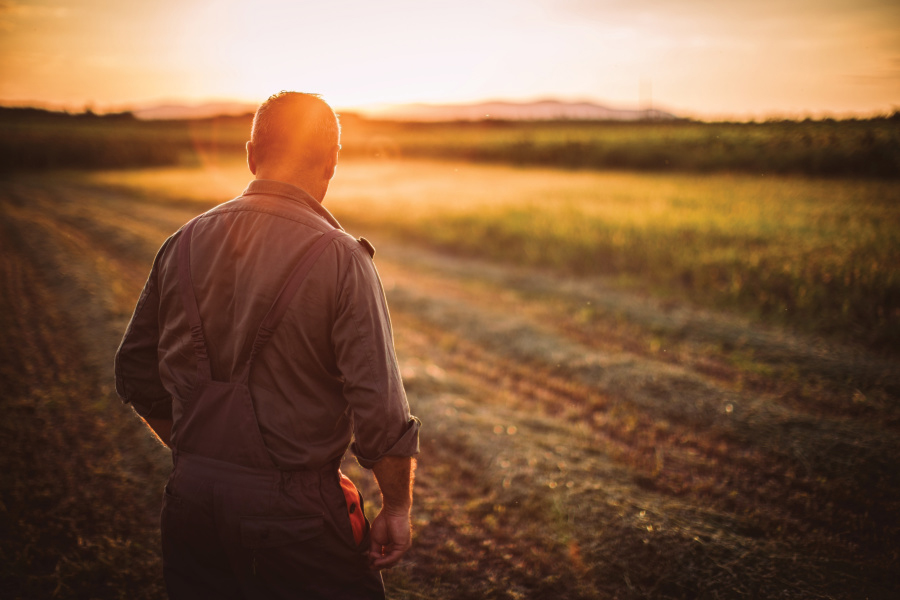
Farmers come from strong stock – they rise before daylight, work around the clock and rarely take a vacation. There are cows to be milked, seeds to be planted, fields to plow, bills to pay and equipment to repair. It can be a struggle just to keep a farm afloat.
“Farming is very important work, and it’s a 24/7 job,” says Heidi Liss Radunovich, a licensed psychologist and associate professor at the University of Florida. “Farmers can’t go on vacation and leave their work behind. They pride themselves on being very strong – on being able to push through and get it done.”
It’s no wonder farmers across America struggle with mental health issues such as anxiety, depression and even suicide. The mental health of farmers wasn’t something professionals began looking closely at until recent years, when agriculture workers began taking their own lives in increasingly higher numbers. A January 2020 study by the Centers for Disease Control and Prevention found that out of all occupations, farmers are among the most likely to die by suicide.
“Farmer mental health has come up as a big issue, and finding solutions is a tall order,” Radunovich says. “They are such hard workers, but sometimes they push through to get the job done even when they’re suffering from chronic or emotional pain. They can’t rest like people in other occupations.”
Farmers in Crisis
Radunovich is collaborating with a group called AgriSafe to improve the mental health of Florida’s agriculture workers. The group secured a Department of Agriculture grant in October 2019 that will allow them to reach out to Florida farm workers and identify issues impacting their mental well-being.
“We don’t have a lot of statistics specific to Florida yet – this is work we still have to do,” Radunovich says. “Most research on farmer mental health has been international or in the Midwest, where they have some different issues than we do.”
Florida farmers are vulnerable to natural disasters, for starters. According to a March 2020 study by the Southeastern Coastal Center for Agricultural Health and Safety, Florida’s agricultural industry experienced an estimated $1.3 billion in losses due to Hurricane Irma and another $1.4 billion in losses from Hurricane Michael from 2017 to 2018.
“Hurricane damage causes economic stress across the agriculture industry. Citrus greening has caused huge devastation in our citrus industry,” Radunovich says. “Florida has dealt with challenges to policies dealing with migrant workers that affect farmers’ ability to get enough workers, and algal bloom has caused water issues.”
Increased regulations on imports and exports along with trade tensions have made it tougher for American farmers to sell their commodities, and key commodity prices have fallen by about 50% since 2012. Economic losses have also hit hard with the outbreak of COVID-19. Farmers who had planned to provide food to hotels, schools and restaurants that closed were suddenly scrambling to find buyers. To make matters worse, many farmers are burdened with large amounts of debt. The threat of losing their farm is so distressing, it’s more than some farmers can bear.
See more: Focus on Heart-Healthy Florida Foods During American Heart Month
Obstacles to Seeking Help
When it comes to getting treatment, living in a rural area puts agriculture workers at a disadvantage. It’s harder to access therapists, and although there have been advancements in web-based therapy, some rural areas still lack high-speed internet access.
Furthermore, the stigma of depression being seen as a weakness has made some farmers ashamed to seek help. The good news is depression is highly treatable with therapy and medication.
“It’s helpful to not focus on having a mental health problem, but instead to focus on wellness and resilience,” Radunovich says. “Think about ways you can strengthen yourself.”
Other obstacles to seeking treatment include lacking insurance and transportation.
“The expense of insurance can be really prohibitive, and if you’re working long hours, it can be hard to get away to the doctor or therapist – especially if they are far away,” Radunovich says.
AgriSafe is creating a crisis hotline specific to farmers to help them connect with local resources because national hotlines aren’t always able to help locally.
“We’re hearing a lot about farmer suicide related particularly to financial stress – the incredible distress that comes with financial loss,” Radunovich says. “Losing your farm weighs very heavily on people.”
One bright spot is that farmers have ample opportunities to dwell in nature, which can have a calming effect on the mind.
“There are benefits to living in rural areas – you don’t have city stressors like crowds and traffic,” Radunovich says. “Research supports the value of living among trees and nature. It can really help your mental health.”
Don’t Miss the Warning Signs
Are you or someone you know suffering from anxiety, depression or thoughts of suicide? These warning signs may indicate you or someone you know may need help:
- Losing interest in things previously enjoyed
- Extreme mood swings; rage or excessive anger
- Withdrawing or feeling isolated
- Sleeping too little or too much
- Acting anxious or agitated; behaving recklessly
- Talking about being a burden to others
- Increased use of alcohol or drugs
- Talking about being in unbearable pain
- Feeling hopeless or worthless, or having no reason to live
- Talking about wanting to die
- Looking for a gun or other means to kill oneself
Need Help?
Talk to your doctor about options for counseling and/or medication. If someone you know is struggling, stop and ask how they are doing. Listen without judgment – their emotions are real. Ask if they have thought about talking to a mental health professional. Ask if they have contemplated suicide. If so, offer to call the Suicide Prevention Lifeline with them or accompany them to the local emergency room. Call one of the numbers below for help.
- Suicide Prevention Lifeline (800) 273-TALK (8255)
- Disaster Distress Helpline (800) 985-5990
- Farm Aid’s Farmer Hotline (800) 327-6243
For more resources, visit floridafarmbureau.org/mental-health-resources.








